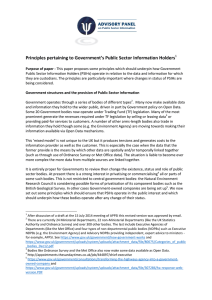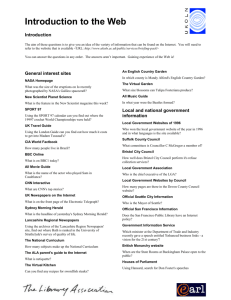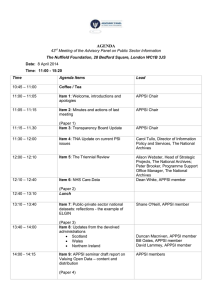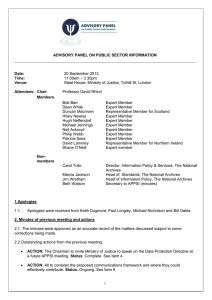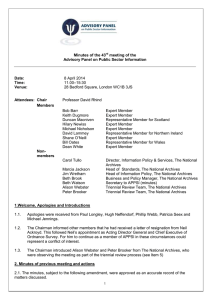Document 11253118
advertisement
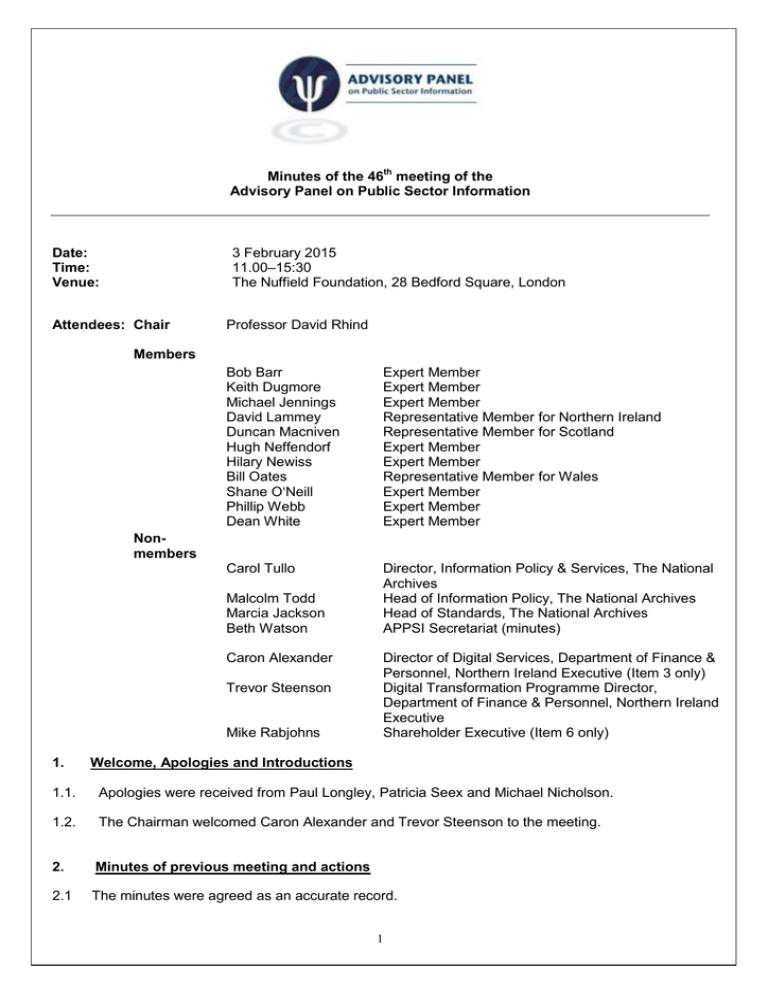
Minutes of the 46th meeting of the Advisory Panel on Public Sector Information Date: Time: Venue: 3 February 2015 11.00–15:30 The Nuffield Foundation, 28 Bedford Square, London Attendees: Chair Professor David Rhind Members Bob Barr Keith Dugmore Michael Jennings David Lammey Duncan Macniven Hugh Neffendorf Hilary Newiss Bill Oates Shane O‘Neill Phillip Webb Dean White Expert Member Expert Member Expert Member Representative Member for Northern Ireland Representative Member for Scotland Expert Member Expert Member Representative Member for Wales Expert Member Expert Member Expert Member Carol Tullo Director, Information Policy & Services, The National Archives Head of Information Policy, The National Archives Head of Standards, The National Archives APPSI Secretariat (minutes) Nonmembers Malcolm Todd Marcia Jackson Beth Watson Caron Alexander Trevor Steenson Mike Rabjohns 1. Director of Digital Services, Department of Finance & Personnel, Northern Ireland Executive (Item 3 only) Digital Transformation Programme Director, Department of Finance & Personnel, Northern Ireland Executive Shareholder Executive (Item 6 only) Welcome, Apologies and Introductions 1.1. Apologies were received from Paul Longley, Patricia Seex and Michael Nicholson. 1.2. The Chairman welcomed Caron Alexander and Trevor Steenson to the meeting. 2. Minutes of previous meeting and actions 2.1 The minutes were agreed as an accurate record. 1 2.2 Hugh informed members that, since the last meeting, the glossary moderation panel had held a telephone conference to discuss proposed amendments. The changes had now been agreed and would be sent to data.gov.uk and the APPSI secretary so that the glossary could be updated. 2.3. The Chairman informed members that GeoPlace had written to explain that, it had agreed at its last Board meeting that it would like to support the release of UPRNs, the issue was now being discussed in the context of broader government decisions on Open Data and is being managed at a central level. 3. Developments in PSI and Open Data in Northern Ireland The Chairman welcomed Caron Alexander and Trevor Steenson to the meeting. He expressed his pleasure at the progress Northern Ireland had made on OD and praised David for his efforts in keeping PSI on the agenda over the years. Caron began by explaining that until her appointment as Director of Digital Services in January 2014, there had been only a piecemeal approach to OD in Northern Ireland. Therefore it was necessary to draw up a new strategy quickly. While the new PSI Directive has acted as a driver for change, it was recognised that this was the right thing to do. It was important to demonstrate that the strategy was for everyone, not only government, and that OD would bring social and economic benefits When drawing up the strategy the team consulted with departmental data managers and the wider public sector, both in Northern Ireland and the Republic of Ireland. They also took into account developments in Europe and existing research into best practice. An OD survey they conducted in November received 84 responses and, as with similar surveys, it was clear that the commercial sector knows what data it wants to access and that it can utilise. The strategy, which has been agreed by the Permanent Secretary and Ministers, sets out nine principles in Plain English: 1) All data on the NI Open Data platform is authoritative, accessible, relevant, timely, accurate and as unprocessed as possible 2) Use of open standards to ensure interoperability 3) Data published on the NI Open Data portal will as a minimum conform to step 3 on the 5star deployment scheme 4) Open standards for publishing data will be built into contracts and procurements for services and systems 5) Use of the Open Government Licence 6) Feedback mechanisms will be available for data released as open data 7) Datasets will be updated in accordance with agreed refresh schedules 8) Transparency about reasons for withholding datasets 9) All data will be considered for archiving With regard to Principle 8, she was clear that loss of income would not be a reason not to release data. It was possible the datasets most in demand would be those where there was most likelihood of the government losing income but it would have to look at other options for generating income if this was the case. 2 It also includes a roadmap which will ensure that the correct governance regime is put in place, appropriate standards are set and put in the public domain, and that departments can identify the information they want to publish. It is also hoped that the new OD platform on nidirect.gov.uk will be fully functional by the end of 2015 at the latest. Northern Ireland OD is currently on data.gov.uk and much is only rated 1 or 2 on 5-star OD deployment scheme. The success of the strategy will depend on business areas breaking with the current culture of protecting their data, and the public being reassured that their privacy is not at risk. Phillip asked how the benefits of the strategy will be measured. Caron said that they would not be quantifying success in strict financial terms as this would be difficult to do, at least at this point. However, they would track released datasets and would continue to work with companies and SME groups to assess how it has benefitted them and the economy. Hugh was supportive of the strategy and was pleased to see that Northern Ireland had adopted its own approach rather than copying the rest of the UK. However, he had some concerns that the terminology used could be taken to suggest that the publication of raw data was automatically preferable to that of processed data; statistical data, for example, was highly processed but still very useful. Trevor agreed that the statement could be rephrased but it was still a good idea to publish data as quickly and as unprocessed as possible and big users wanted unprocessed information for data-mining as it avoided the need to disaggregate. Caron confirmed that the publication of processed data would still be acceptable if it was in the correct format. David asked if there were any high value government datasets which could be released. Trevor there was a particular interest in putting transport data on the new platform and the Northern Ireland Department for Education had already published much of its data. Departments were keen to see their information being used more and initial reluctance to release information caused by data breaches was breaking down. 4. TNA Update on current PSI Issues Staff changes Carol informed members that Malcolm Todd had been appointed as Head of Information Policy following the retirement of Jim Wretham. A new member of staff has also been recruited to produce and edit guidance on information policy and official publishing issues. Outreach The National Archives has continued its outreach work and has run a number of workshops and seminars in Wales, Scotland and Northern Ireland to explain the impact of the new Directive. In November Carol spoke at the Centre for Freedom of Information’s European Conference in Edinburgh, and a seminar has also been run for Scottish Local Authorities. Marcia has been working closely with museums, archives and galleries to encourage the culture change necessary to facilitate the introduction of the Directive’s requirements. Triennial Review of the Information Commissioner’s Office (ICO) The National Archives has been assisting colleagues on the Ministry of Justice on the triennial review of the Information Commissioner’s Office. The consultation, which closed on 16 January, received 165 responses (the highest number ever received). It is expected that the outcome of Stage One of the Review will be published by the end of March 2015. Transposition The OD community had continued to press for the ICO redress option and The National Archives had therefore reopened the discussion with HM Treasury, the ICO and Scottish Information Commissioner. HM Treasury were initially of the view that a public sector body could not make decisions that could affect the funding and business model of another public sector body. They 3 also had concerns about the impact on public expenditure of any judicial redress mechanism, although taking the complaints received over the last ten years as a guide, it is unlikely that many would be of a magnitude to concern HM Treasury. However, at a meeting last week HM Treasury had agreed to the ICO option and the ICO, the Scottish Information Commissioner and departmental lawyers had been consulted. It has been agreed that, if a commercial trading body wishes to appeal against an ICO decision notice, the review will be undertaken by the First Tier Tribunal. There would also be an option to subsequently refer a case to an Upper Tribunal but it was not expected that this would be used in many cases, if appeals followed the same pattern as FOI. The National Archives would now redraft the provisions in the Directive to reflect this agreement and to revise the impact assessment. It will then be necessary to obtain Ministerial approval. If it is not possible to do this before the start of purdah, the intention is to publish the Government’s response to the consultation and a written ministerial statement setting out the next steps. The Chairman observed that the proposals represented a fundamental change and asked about the potential impact on OPSI. Carol explained that it was only its role in complaints handling that OPSI would lose, and she agreed with members that this could be a positive move as it would reinforce OPSI’s position as the provider of independent guidance and support. She also confirmed that OPSI had been working closely with the Charity Commission and organisations such as museums and archives that would fall under the scope of the new Directive. 5. Developments in the Public Sector Transparency Board (PSTB) The PSTB met on 15 January. At the meeting The National Archives presented a paper legislation data, DWP gave a presentation on its work on OD and Heather Savory spoke on the National Information Infrastructure (weblink circulated to members previously). There was also a discussion on the change in status of Ordnance Survey (see item 6 below). It was made clear that OS data would remain Crown, as would any work done on it, and Carol has subsequently received written confirmation of this from the Minister of State for Business, Enterprise and Energy, Matthew Hancock. 6. Change of Status for Ordnance Survey: what does it mean? The Chairman welcomed Mike Rabjohns from the Shareholder Executive (ShEx), who spoke to members about the anticipated impact of Ordnance Survey’s (OS) transition from a Trading Fund to a Government owned, contractor operated company (a GoCo). The change in status had been announced by the Minister of State for Business, Enterprise and Energy, on 22 January 2015. As OS’ current business model was already very close to that of a limited company, the change is unlikely to have a huge impact in practice – it is essentially ‘a change of wrapper’. It will still be required to publish a statement of its public task and will be covered by the IFTS and Crown copyright (although Crown to Crown agreements will no longer be possible). However, putting OS on a proper competitive footing and giving its Board more responsibility for how it operates will enable it to keep pace with the rest of the market. This was particularly important for its consultancy arm, which is expanding but is currently limited by Civil Service restrictions on the nature of the work it can undertake. In terms of Open Data (OD) it is also hoped that it will lead to better licensing arrangements and generate new opportunities to make more data available. The Board will be able to take into consideration commercial factors when deciding on what data to make publically available and at what cost but they will remain accountable to Ministers who will sign off OS’ departmental strategy, including its plans from Open Data release. Mike stressed that there was no intention to privatise OS and, like the Royal Mint, it would remain wholly publically owned. In response to questions from members he explained that the Government needed to see an acceptable return from its investment so the GoCo would pay a dividend but that this would be subject to corporation tax. Pay scales for staff were yet to be 4 agreed but it was expected that pay settlements would not be subject to the same restrictions as those for civil servants. Bill expressed concern that well-established working relationship between the Welsh Government and OS was at risk with OS’ change in status. To this point the sharing of expertise and information necessary to developing the products the Welsh Government needed to underpin its legislative programme had been possible because it was civil servant to civil servant. He wondered how this relationship could continue if OS was no longer a Crown body. It was Mike’s view that the relationship need not change substantially although Crown to Crown agreements would not longer be possible. A decision was still to be made about the PSMA so it was not clear that this point whether current arrangements are repeatable. ShEx would keep the PSMA user group informed of developments. Members noted that a change of status could cause extra bureaucracy where new agreements needed to be drawn up and hoped that measures would be in place to avoid this. Phillip asked what measures were being taken when recruiting senior staff to ensure that OS attracted entrepreneurs and experienced commercial operators who could push the organisation forward. He also asked what the response from business had been to the change of status. Mike said that work would be done on putting a suitable remuneration framework in place and to allow OS management sufficient freedom to run the business in a way that would make it successful. There had been little response from commerce about the change of status but what had been received was broadly positive. Shane said that there was considerable concern in the partner group about OS’ growing commercial operations and in particular its overseas expansion. . Mike agreed that OS communications with partners needed to improve and that it had already started to lay the foundations of a partner first strategy. It recognised that it needed to move forward as the market changes but this should not be done at the expense of the current market. Bob asked if the accounting standards observed by OS would change with its new status. It could be argued that the NAO had valued the OS database incorrectly as its value depends on the future of the data and OS could have been given an unfair advantage over competitors. Mike said that accounting practice was being examined. Hugh asked if the balance of revenue from government and other sectors would change. Mike said it was possible that public sector organisations would be less willing to pay but the possible growth in OS’ consultancy business could balance this out. Dean asked if OS as a GoCo would have exclusive rights when it came to licensing data. Carol confirmed that OS would still be subject to licensing restrictions. The Chairman thanked Mike for his participation in the discussion. 7. The ESRC Big Data Programme and use of private sector data for academic research Keith Dugmore gave a presentation on the work of the ESRC’s Consumer Data Research Centre (CDRC). Members were particularly interested in the possibilities of greater data sharing between the government and commercial organisations to improve public policy making. They wondered, for example, if Boots or GSK could work with the NHS, or utility companies should share their data to help the Government identify instances of fuel poverty. However, they recognised that robust rules need to be in place to regulate how information could be reused, to strike the right balance between what can be done in terms of data analysis and what should be done, and to reassure the public that their privacy would not be violated. 8. The potential role of synthetic or modelled data and its impact on PSI and Open Data Hugh explained that there is a growing interest in synthetic data, as demonstrated by the setting up of a Cabinet Office taskforce on modelled data. This is partly due to the recognition that big data can be very biased and that there is therefore a need to understand and correct for this. It is 5 also becoming increasingly hard to convince the public that actual data can be anonymised to the extent that it cannot be cracked. Synthetic environments are formed of agent-based models and can be very realistic representations which produce usable data. Their use is most advanced in the defence sector but as synthesising avoids data protection and anonymisation issues, there is scope for their wider use, including possibly future censuses. Members were interested to know how modelled data could be validated. Hugh said that a lot of work was being done on aggregate data, looking at outputs and comparing them with counts. It was suggested that researchers could take aggregate data from the census, simulate multiple populations and then compare the results with the actual census. Hillary suggested that the risk of deanonymisation was likely to have been overestimated following one or two high profile cases. However, using synthetic data would overcome concerns over privacy, especially relating to health data, and would allow the release of data that otherwise could not be released. Dean noted that Health England were looking at the possibilities of using synthetic data. Members agreed that the increased use of synthetic data could help to change the public perception of the re-use of PSI. 9. Updates from the Devolved Administrations Scotland Duncan informed members that the Scottish Open Data Strategy was waiting for Ministerial sign-off but a seminar had been held to give an overview of it. It is an 8-page, high-level document which focusses on encouraging public sector organisations to publish their own data rather than creating a centralised repository for Scottish OD. He also noted that the Scottish Neighbourhood Statistics site was now at the testing stage. It is envisaged that the site will enable small organisations to publish on this OD public platform site and the emphasis will be on publishing data even if it is not perfect. In the local authority arena, the Scottish Cities Alliance project had recently received £10 million to develop further initiatives modelled on OPEN Glasgow. There is also a renewed push to link local authority social care and health data. Wales Bill informed members that there had been no major developments since the last APPSI meeting. Ministers were still considering the proposed data strategy. Northern Ireland David informed members that Northern Ireland’s new data strategy had been submitted to Ministers. It focusses on refreshing data rather than pushing for the release of datasets and is high level. To ensure that targets are met an implementation board will be established, supported by an advisory board of experts and a technology sub-group. It is expected that the First Minister and Deputy First Minister will agree the strategy and this will encourage other Ministers to commit to supporting the roll-out. The Chairman observed that, after slow start, Northern Ireland had come a long way on OD and much of this had been due to David’s hard work. He thanked David for his commitment. 6 10. The Chairman’s meeting with the Minister for Justice and the future of APPSI The Chairman met Simon Hughes in November to discuss the provisional outcome of the triennial review. After consultation with the Cabinet Office Mr Hughes subsequently agreed to accept the recommendations of the triennial review report that there is no longer a need for the current non-statutory functions of APPSI to continue. The Chairman informed members that a written ministerial statement had been issued at 9:30 announcing that APPSI would cease to carry out its non-statutory functions and would be abolished once its statutory function ceases to exist with transposition of Directive 2013/37/EU during 2015. Carol explained that The National Archives would work with APPSI on the winding up arrangements, including the archiving of the website and identifying an internal team or other department to host the PSI and OD glossary. Members stressed that it was important that the information and papers published on the website were not lost and that the glossary was maintained. Hugh thought it unlikely that the Cabinet Office would want to take on the glossary although they could still be asked. If they refused, The National Archives would be suitable custodians. It was agreed that, as APPSI included representatives from the devolved administrations, as a courtesy letters should be sent to inform them of the outcome of the review. Members agreed that a final overview of APPSI’s work should also be published. This could be an update of 2013’s Impact of APPSI report. In terms of the statutory functions it would be necessary for arrangements to be in place to enable Review Boards to be convened if a complaint was referred to APPSI. While members whose terms ended from this point would not be replaced, a sufficient number of members would still be in place by the transposition deadline to form a Board if required. However, the Chairman’s current term would end on 30 April and he announced that he would not be seeking an extension. Therefore, it would be necessary to appoint a temporary Chairman from amongst the current members who could serve from the end of April until abolition. ACTION: The Chairman asked that expressions of interest from members be sent to the secretary. The wording of the written ministerial statement meant that there was some ambiguity over whether APPSI should continue to operate as normal until transposition or if it should cease to give advice to Ministers with immediate effect. Members agreed that there should be a final short meeting for current members, which could be followed on the same day by an event to include former members and others in late March or early April. ACTION: The secretary would circulate possible dates. At the end of the discussion Hugh thanked the Chairman for his leadership and commitment to APPSI. 11. Any Other Business None. 7
